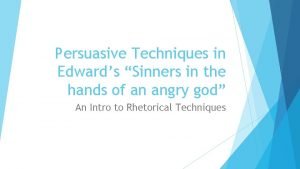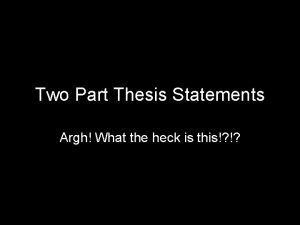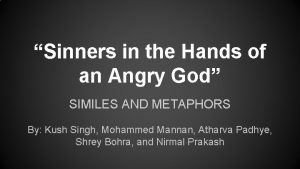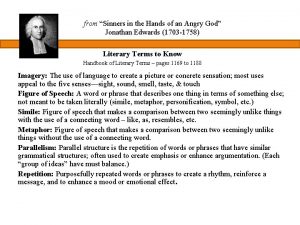From Sinners in the Hands of an Angry








- Slides: 8

From Sinners in the Hands of an Angry God Jonathan Edwards

Rhetoric: the art of speaking or writing effectively (Merriam-Webster) Greek philosopher Aristotle identified three keys ways that writers can appeal to their audiences in arguments. Pathos (emotional): makes an emotional connection with the reader. Often uses vivid imagery and descriptive language. Intended to make the reader/listener/viewer to feel an emotion: fear, sadness, hope, etc… Ethos (credible): an ethical appeal that helps the reader make a connection based on a concept like being a good human, parent, citizen, patriot, etc. It also can be when an expert or authority figure is referenced and refers to the expertise or character of the person. Logos (logical): When an appeal uses logic, reasoning, or data to support an argument to convince a reader. Rhetorical Appeals in Persuasion

from Losh Alex’s Understanding Rhetoric

• Imagine that you are sitting in class and your teacher asks for your completed homework. You rustle around in your backpack for a while until you realize—Oh, no! You left your homework at home, completed perfectly. • Use the rhetorical appeals to avoid a late grade from your teacher. Ethos: Logos: Pathos:

• Imagine you were a student sitting in algebra when your teacher says, “Okay, class, get out your homework. ” You rustle around in your backpack for a while until you realize—Oh, no! You left your homework at home, completed perfectly. • Use the rhetorical devices to receive avoid a late grade from your teacher. Ethos: Logos: Pathos: I always turn in my assignments on time and they’re always perfect. Isn’t the purpose of homework to learn the given information? Everything was already explained in class. It really isn’t necessary for me to turn it in if I know it already. My dog died this morning and I completely forgot to bring my assignment to school.

• Revivalist preacher in 1730 s to 1740 s • Headed the movement “The Great Awakening”– an attempt to counteract the rationalist movement taking hold • Edwards believed in the power of God and the wickedness of humans, the reality of hell, and the necessity of conversion • Known for preaching “fire and brimstone” in his sermons Jonathan Edwards

• What is Edwards’ purpose? • Which rhetorical appeals does he employ to convey his message effectively? • How does he use extended metaphor to help persuade his audience? Consider while reading

Reflection/Synthesizing: Answer the following question as completely as you can, using complete sentences and textual evidence. • Which rhetorical device do you think was most effective in Edwards’ sermon? Why? Consider his audience, purpose, and the historical context. In your response, use the five vocabulary words from this reading and underline them. For Friday
 Alliteration in sinners in the hands of an angry god
Alliteration in sinners in the hands of an angry god Soapstone for sinners in the hands of an angry god
Soapstone for sinners in the hands of an angry god Old lights apush definition
Old lights apush definition Sinners in the hand of an angry god summary
Sinners in the hand of an angry god summary Repetition in sinners in the hands of an angry god
Repetition in sinners in the hands of an angry god Sinners in the hands of an angry god thesis statement
Sinners in the hands of an angry god thesis statement If god should only withdraw his hand from the floodgate
If god should only withdraw his hand from the floodgate Symbolism in sinners in the hands of an angry god
Symbolism in sinners in the hands of an angry god 1st great awakening apush
1st great awakening apush












